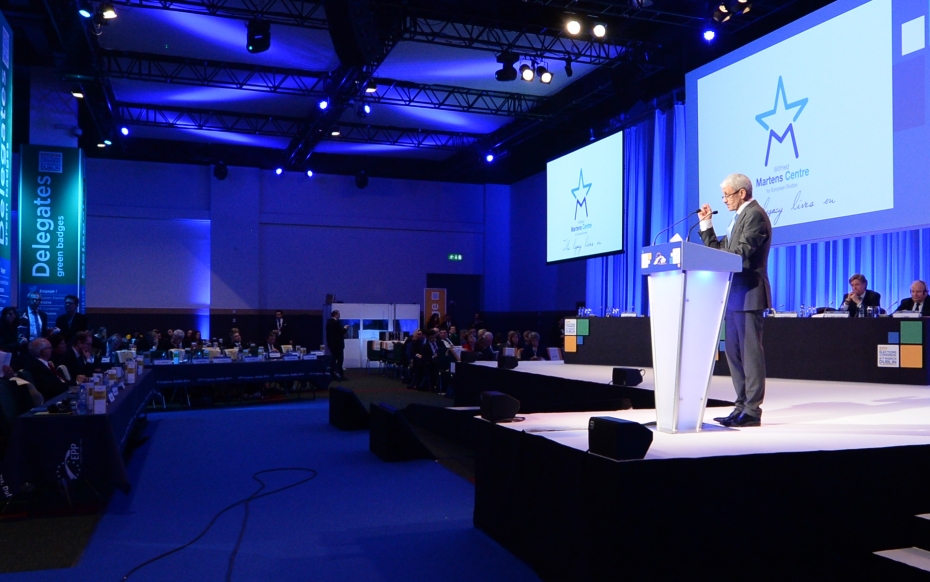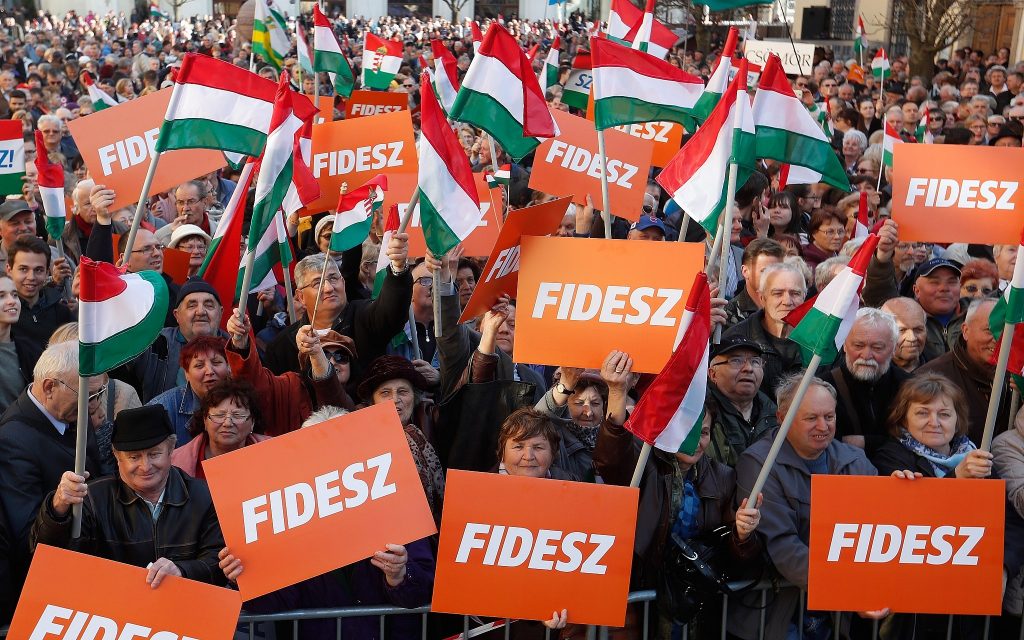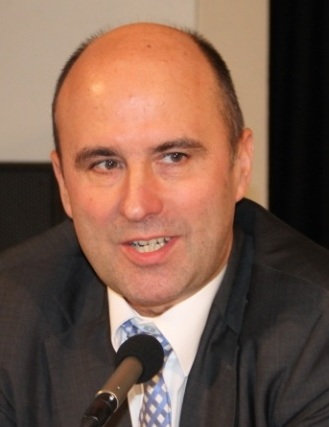Roland Freudenstein talked with CEA about the future of foundations, Viktor Orbán being a gambler, the biggest challenges facing the EU, why Europe would be in a vaccination war without the EU and why Fidesz will never reestablish full membership rights in the EPP.
Host: Zoltán Kész
Thinking is important. This is especially true in the times of crisis. The role of think tanks becomes even more significant under such circumstances than during normal times, “because they try to make sense of what is happening.”
Unfortunately, not everything is positive. Like in so many other areas, for think tanks as well, there are ups and downs in turbulent eras.
For years to come, societies will suffer the economic consequences of the Covid crisis. “Sooner or later, it will rub off on the financing of not only of public services, schools, universities but also on think tanks,” explains Mr Freudenstein.

The Wilfried Martens Center, Mr Freudenstein’s home institution, which is the party foundation of the European People’s Party, is completely financed by taxpayer money. “We might also suffer the consequences one day.”
The current situation is even more dire for think tanks depending on private financing and donations. These are already “feeling the heat” as private donors and sponsors are breaking away. “This is quite a dramatic development,” he says.
National vaccination efforts
The political scientist criticizes national solo efforts by EU member states in the vaccination procedure and warns that if there wasn’t the EU today, “we would have vaccination wars between European countries.”
Small countries would have “no chance” negotiating favorable conditions and deals with big pharma companies if left on their own and if they had to compete with large member states. “That’s a big advantage of the EU,” he argues
Mr Freudenstein admits the EU has been slower to certify vaccines than Israel, the UK or the US, and the European community could have used better negotiation skills via-a-vis companies like Astra Zeneca. “This is a major scandal.”
On the other hand, it was “way better” to have the EU than not to have it. “It would have meant that small and not so affluent countries would have completely been thrown under the bus,” he warns.
He sees Viktor Orbán’s Covid vaccination policy as a “gamble”. There are governments deliberately renouncing the safety standards in the EU for vaccine. They are doing this “just to get a big number of vaccines faster.”
The EU can’t prevent the governments from doing so, but they are “gambling with the health of their citizens.”
EPP-Fidesz: a poisoned relationship
Hungarian prime minister Viktor Orbán is also gambling on another front: his party’s EPP membership. “Some say Orbán is a gambler by nature, he likes to attack and win,” Mr Freudenstein claims.
Hungary’s governing party is fighting to remain in the EPP, although its membership is suspended. Among other things, Fidesz cannot participate in meetings, in official organs of the EPP, it can’t take part of the process defining the future of the political family.
Although the Fidesz leadership is trying to portrait this as a mutual suspension, “we know that the suspension happened against the will of Viktor Orbán.” “He was not winning at that moment.”
How long Orbán’s one foot in, one foot out policy can be maintained? “It can go on forever,“ he says. There will not be a majority to reestablish full membership rights of Fidesz, “unless Fidesz fundamentally changes its course.”
Does he expect it to happen? “I don’t think so,” goes the answer.
Quo vadis Fidesz?
The EPP membership question has been thoroughly examined and analyzed by the spin doctors around Viktor Orbán. One of the options for Fidesz would be joining another political family. “This is certainly on the minds of Fidesz leaders.” One example for that was foreign minister Péter Szíjjártó’s trip to different populists and sovereigntists leaders.
Still, there are no easy alternatives for Fidesz. There are two political groups in the European Parliament Hungary’s governing party could be part of.
Matteo Salvini’s Identity and Democracy is “highly heterogeneous, very disorganized and without a coherent ideological concept”. For Fidesz, “it would be difficult to join such a party.”
The European Conservatives and Reformists group offers a “slightly better” structure. Nevertheless, the Fidesz plan to create one big, right-wing, anti-migration movement in the EP would be impossible. This became clear after the latest EP election.

“For the moment, remaining with one foot in the mainstream and flirting with right-wing alternatives at the same time is the best bet Fidesz seems to have,” Mr Freudenstein says.
The expert rejects claims pointing to EPP alternatives in Hungary to Fidesz, despite leaders of Jobbik suggesting the opposite. Currently there are “no concrete plans to reach out to anyone. The situation is frozen.”
Also, he rejects the idea of Viktor Orbán applauding Brexit and wanting to leave the European community. “Hungary would be completely stupid to exit the EU.”
Saving democracy
The biggest challenge for the EU in the upcoming years is saving democracy. In the entire world, authoritarianism is competing with liberal democracy. The same is happening inside the EU and inside most member states.
“We have authoritarian governments in the EU with sovereigntists, nativists, authoritarian parties that would like to transform their countries into autocracies if they came into power,” Mr Freudenstein warns.

The democrats of the world need to come together and defend democracy and principles like constitutionality, rule of law and check of balances in their own countries. They should increase global support for democrats in all countries. “From Venezuela to Hong Kong, from Moscow to Minsk.”
Liberal democracy is not liberalism
Mr Freudenstein appeals for liberal democracy and denies Fidesz claims that it would equal liberalism. “We are talking about two different things,” he says.
Liberalism is political philosophy and liberal policies are confined to one part of the political spectrum in a democracy. Liberal democracy, on the other hand, is a constitutional guarantee of checks and balances, independent institutions, free and pluralistic press, a vibrant civil society, independent courts and institutions.
“In the Hungary debate it’s just swept under the carpet as if liberal democracy was an electoral system in which liberals always have to win,“ he argues. “This is how Hungary’s international spokesman Zoltán Kovács puts it.”
In reality, the spokesman’s claim is nothing else than the “deliberate reversal of truth”. There is no aspect of “George Soros financing this idea”, there is “nothing pro-migratory in liberal democracy”.
“I wish the EPP was more determined in rejecting these totally false representations of reality”.
Cover photo credit: Flickr, European People’s Party cc by 2.0

Roland Freudenstein is the Policy Director of the Wilfried Martens Center for European Studies, the official think tank of the European People’s Party. Previously, he worked as a research fellow at the German Council on Foreign Relations and became a member of the foreign and security planning staff of the European Commission in Brussels. Later, he was the Director of the Warsaw office of the Konrad Adenauer Foundation and represented the German town of Hamburg to the European Union. He has published extensively on global democracy support, European integration, Russia and Eastern Europe. Twitter: @RoFreudenstein
Photo credit: Globsec.org



